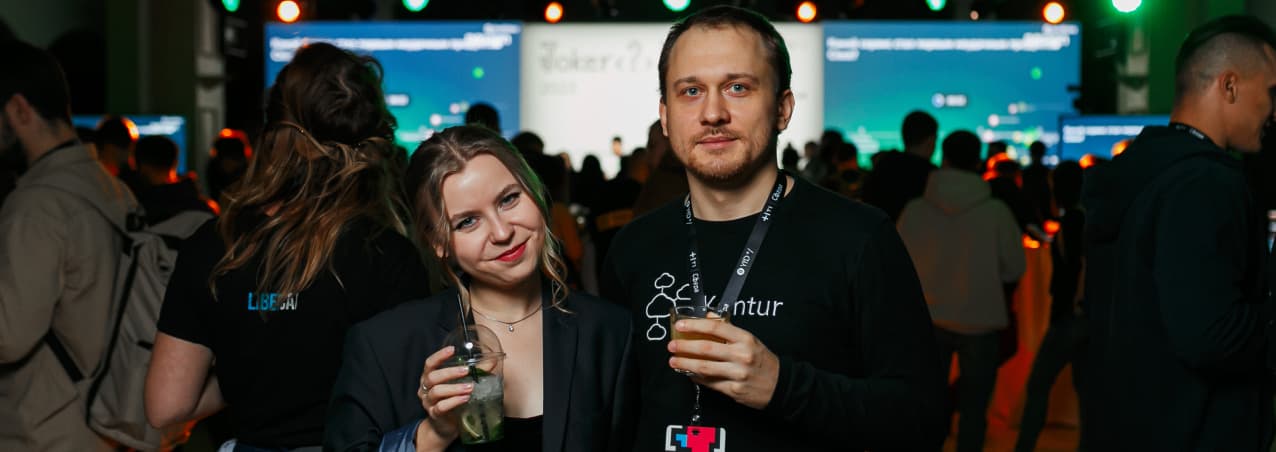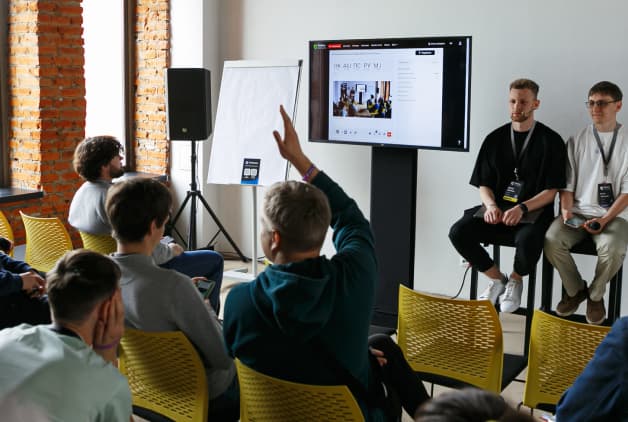Offline JPoint. Moscow
April 24–25 00:00–00:00 (UTC+3)
Offline: WTC Congress Center, 12 Krasnopresnenskaya emb.
It’s offline, where you
- Chat with colleagues. Catch speakers to talk to or consult with experts.
Join various activities
Participate in sessions, contests and quizzes. Complete quests or compete in games.Hanging at the booths
Meet new projects and companies. Network on career topics. Get merch.
Ask Expert
1 on 1 sessions with an industry expert. 25 minutes of usefulness. It works like this:
Any participant with an offline ticket can apply for an expert session. Just email to support@jpoint.ru.
Choose «your» expert
Expert specialization is listed on the website. Formulate a question or a topic for discussion — and submit it.
Receive confirmation
Experts select from among the applications — interesting for himself. We inform you of his decision.
’Consult’
The meeting takes place offline, in a private setting. You gain valuable knowledge in a relaxed manner.
Talk type: Ask Expert
April 24, 12:30–14:30
On the first offline day of JPoint 2024.
While you are still fresh and awake, energetic and open to new things.

Alexander Pashenko
Company: VK

Alexander Nozik
Company: MIPT

Ilya Sazonov
Company: Vsegda.Da

Roman Elizarov
Company: Yandex

Maxim Gorelikov
Company: m2.ru

Sergey Melnikov
Company: Dijkstra Markets
Talk type: Ask Expert
April 25, 12:00–14:00
On the second offline day of JPoint 2024.
When all the booths at the venue have been explored, contests have been held and merchandise has been collected.

Vladimir Voskresensky
Company: Sber


Alexander Matorin
Company: Sber


Alexander Lantsov
Company: Mir Plat.Form

Andrei Kogun
Company: KROK
Please note that the conversation with an expert may fall during the time of a talk. It is not a big deal — you can always watch the talk in the recording afterwards.
Offline only, no recording
April 24
- No record
Talk type: Conversation
Lightning Talks
Lightning talks are a great format to discuss a topic in a dynamic way and find like-minded people. Ten-minute talks on professional or near-professional topics and lively discussions are waiting for you. Have you long wanted to try your hand at being a speaker? Are you eager to share your ideas or case studies with the world? Have you seen Heisenbug's talks and feel you can add something of your own to them? Apply in advance via the link or sign up to speak directly at the venue!
- No record
Talk type: Partner’s game
Coffee Code: Developers Vs YandexGPT and Holivar Boulevard
All day on April 24, the Yandex team offers conference participants to take part in a quiz, competing with YandexGPT. The superfinal of the quiz will be at the beginning of the afterparty — where they will raffle off a smart speaker Yandex Station Max with Alice. And the fastest and the most inventive ones will take away bags with cool merch!
Do you like to dispute? Then come to the Holivar Boulevard! During the day, the Yandex team will be holding a vote for the most controversial topics, which we will discuss in the evening in the discussion room.
In addition to the activities, the Yandex team will provide Java cocktails and karaoke.

Andrei Zakhriamin
Company: Яндекс
At the venue, in general

Afterparty
A party for participants, speakers, experts and hosts. The menu includes drinks and appetizers, informal networking and a great time spent.
Lunch and coffee breaks
Buffet for all participants. Drinks and snacks of your choice in between.
Networking
Meeting colleagues from different companies. Sharing ideas and contacts.
Mix of various formats
Discussions and informal talks with speakers and participants. Round tables, BoF sessions and Lightning talks.
If you can’t participate offline or want to leave early, there is always an online broadcast of all the talks from the main program. Then there are video recordings available.
FAQ
Where will the offline part of the conference be held?
Offline part will be held on April 24–25 at the following address: Moscow, 12 Krasnopresnenskaya emb., WTC Congress Center.When will the program and time for the offline part of the conference be known?
We begin publishing the program in batches on the conference website one month in advance.What activities will be included on the offline part of the conference?
There will be on the offline part:
- talks;
- roundtables;
- BoF-sessions: meetings of interest without a scheduled schedule;
- discussions with offline and online speakers who will come to the site;
- Afterparty for participants at the end of the first offline day.
Will there be an online broadcast of the offline part of the conference?
We will broadcast live most of the activities of the offline part: talks, roundtables, etc.
Discussions and BoF-sessions will not be broadcast or recorded.
Offline was so long ago that I no longer remember what the procedure was for offline conferences.
Don’t worry, before the conference we will send you a participant’s memo. It will contain all the necessary information.Can I buy a ticket only for the offline part of the conference?
To attend the offline part, you must purchase an ONLINE + OFFLINE ticket. It entitles you to attend the offline part of the conference and lifetime access to the recordings of the online part.How do I get into offline part if I have a ONLINE ticket?
If you already have a ticket for the online part of the conference, you can upgrade it to ONLINE + OFFLINE. To do so, email our support team at support@jpoint.ruHow do I get to the offline part if the company only paid for my ONLINE ticket?
If the company that paid for your ticket is not willing to upgrade to ONLINE + OFFLINE, you can do it yourself at a discount. The discount is given for taking the survey after the online part of the conference ends.Is there a limit to the number of tickets for the offline part?
The number of tickets is limited to the capacity of the conference venue.
So it is better to buy tickets in advance while they are available.
Are there any restrictions on going to an offline conference?
There will be no COVID restrictions on site visits. You don’t need QR codes or PCR tests to enter the venue. For your safety a qualified medical worker is constantly on duty at the site.
However, if you’re feeling unwell, it’s best to refrain from going offline. You will be able to participate in the offline part remotely or watch the performances in the recording.

